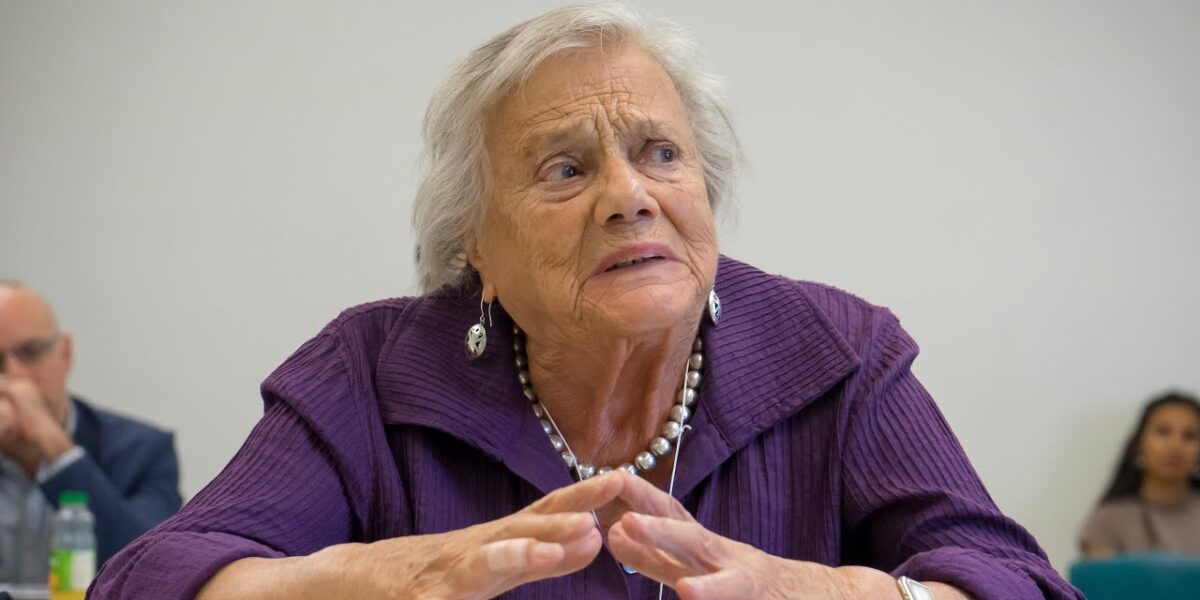June 14 is the one hundredth birthday of economist Kari Polanyi Levitt, world renown for her contribution to development economics, A birthday celebration is being hosted by Concordia University. Scholars from Canada, and around the world will address her life, and her work.
Kari was born, and raised in Vienna. Daughter of economic journalist, and author of the The Great Transformation, Karl Polanyi, her family of intellectuals includes her cousin, Nobel Prize winner in Chemistry John Polanyi of the University of Toronto.
In 1934 with German Fascism on the rise she was evacuated to England to join her father already in exile, and to attend school. Her political activist mother Ilona Duczynska would follow in 1937.
Kari was accepted into both Oxford and Cambridge, but chose to attend the London School of Economics where she studied statistics. LSE was transplanted to Cambridge because of the Blitz, and Kari came into contact with famous Cambridge economists Joan Robinson, and Sir Arthur Lewis. Her professor Nicholas Kaldor enlisted Kari to join his team studying the impact of the Allied bombing on Germany.
Kari married a Canadian war hero, Joe Levitt, later a noted historian of Quebec, the biographer of Laurier, and settled initially in Toronto.
After 10 years working, first in factories, and then as a research officer for various trade unions, including Mine Mill, Kari Levitt completed an M.A., and began her career in the economics department at McGill.
In her order of Canada citation Kari is credited with establishing International Development as an interdisciplinary academic field of study. Throughout her career she was a builder, a co-founder of the Canadian Association for the Study of International Development, contributor to the Association of Caribbean Economists, and with Professor Marguerite Mendell establishing the Karl Polanyi Institute at Concordia University.
The Institute began modestly as a repository for the Polanyi papers. It grew into a research centre, conference convenor, and network for colleagues interested in socialist economics.
Karl Polanyi had an approach that was neither Marxist nor Keynesian, but open to both. His research was empirical, and his theoretical advances were based on history.
The Karl Polanyi Institute has become a major international success. Interest in the work of Karl Polanyi has exploded, attracting many scholars looking for a new home. Nearly 80 years after the publication of his major work, he is considered a twenty-first century thinker, recording record numbers of citations each passing year.
The work done by Levitt and Mendell has helped incubate other Polanyi research centres in South Korea, Budapest, and Vienna.
The Order of Canada citation also recorded that Kari’s work had created “controversy,” an understatement.
The publication of her work Silent Surrender: The Multinational Corporation in Canada in 1970 arrived in the middle of ongoing debate generated by former Bank of Canada Governor James Coyne and one-time Minister of Finance Walter Gordon. Their concern — expressed from the highest reaches of Canadian government — was that U.S. domination of the Canadian economy was leading to the political subordination of Canada to the U.S.
Silent Surrender was prefaced by Professor Mel Watkins of the University of Toronto whose 1968 Watkins Report on Foreign Investment in Canada commissioned by the Pearson Government, at the insistence of Walter Gordon, had documented the growth of American ownership of Canadian industry.
It was left to Kari Levitt to dismantle the argument that ownership of the economy did not matter, and that economics could be separated from politics. She cited Prime Minister Pearson on Vietnam. When critics were asking how he, as a Nobel Peace Prize recipient, could be silent on the war, Pearson said Canada had to proceed carefully to not lose access to U.S. export markets.
Levitt exposed the link between economics and politics. Though economists and political scientists often wrote as if they were separate domains, the history of Canada showed the two could not be separated.
The increasing American ownership of the Canadian economy meant Canadian governments had to be increasingly attentive to U.S. wishes.
Her statistics showed how the utopia of the self-regulating market composed of “firm and consumers” had been superseded by a “new mercantilism embodied in U.S. multinational corporations buying up Canadian productive capacity and resources.
Her book kick-started the study of Canadian political economy, and fuelled debate among scholars. Did the nationality of the capitalist owning class matter? Could parliaments and legislatures exercise democratic control and regulation over absentee landlords backed by the U.S. government?
Silent Surrender sold 40,000 plus copies and remained in print until a second edition replaced it in 2002.
The B.C. author George Bowering in his collection Left Hook remarked that when asked the question: what does it mean to be Canadian, the answer was to the effect “can I get back to you on that,”
International development economist Kari Levitt explained to Canadians why citizenship in any country was compromised when its economy was controlled by outside forces.



